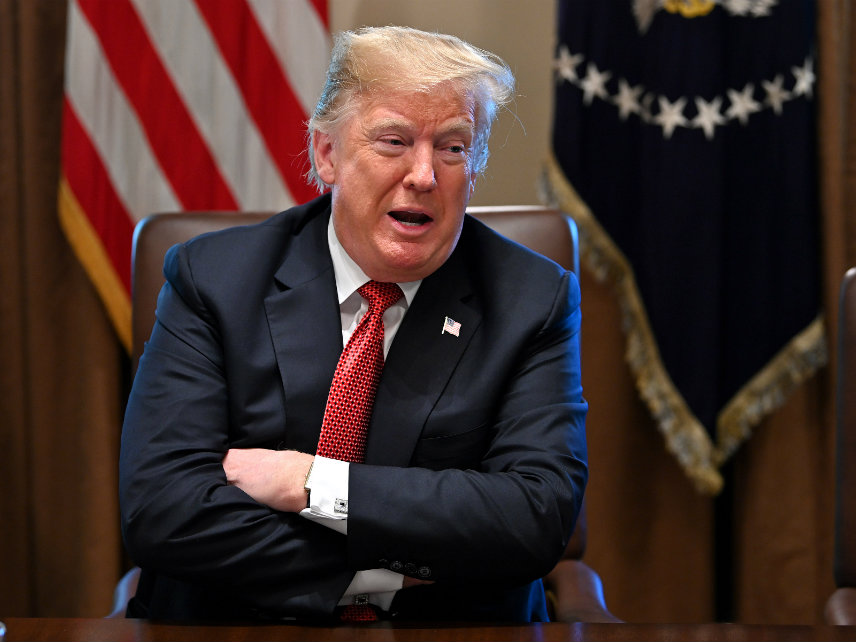Trump Orders 5 Percent Spending Cuts Across All Federal Departments
But there are at least three good reasons to be skeptical this will happen.

President Donald Trump made headlines on Wednesday for telling his cabinet secretaries to plan for 5 percent budget cuts next year. That's a great idea, so it's too bad that it probably won't come to pass.
"I'm going to ask each of you to come back with a 5 percent budget cut from each of your departments," Trump said, encouraging the heads of some unspecified departments to "do even more" and propose further cuts. "I think you can do it," the president said. "Get rid of the fat. Get rid of the waste. I'm sure you can do it."
To be sure, with America facing a large and growing federal budget deficit—the Treasury Department reported Monday that the 2018 fiscal year ended with a $779 billion deficit, the largest since 2012—any discussion of paring back federal spending is welcome. It's heartening to see that Trump is apparently interested in addressing the federal government's out-of-control spending, or at least following through with reducing spending to offset the tax cuts passed in 2017.
Still, there are at least three good reasons to be skeptical of Trump's announcement.
First, there is the way the announcement was made. After three days of headlines about the growing deficit—a deficit that was caused in no small part by Republican-led efforts to hike federal spending this year—Trump pitched his spending cut plan in front of the media just moments before heading into a closed-door meeting with the heads of executive departments. The timing, along with the utter lack of specifics, makes the whole thing look more like an effort to generate positive headlines than to substantively address spending.
If so, it was a success. Most major media outlets reported on the president's "proposal" to cut spending—though, of course, no such proposal actually exists. For now, those 5 percent spending cuts are vague and ephemeral. Listen to the full video of his remarks, and you'll hear Trump admit that the 5 percent threshold might not apply to all departments. Still, the White House got a media cycle of headlines that suggest it is aiming for fiscal responsibility, which is a messaging win for Republicans in advance of the midterms.
But let's give Trump the benefit of the doubt, and assume that every executive department and agency offers 5 percent spending cuts for next year that Trump can include in his budget. That would make for an entertaining State Of The Union address, if nothing else.
But the second reason to be skeptical of these unspecified budget cuts is that the president's budget typically matters about as much as a single vote in a national election. Congress makes all the final decisions about budgeting, and there is very little indication that the current Congress is interested in cutting spending. Last year, for example, Trump made specific proposals for cutting food stamps, farm subsidies, and other discretionary programs. Overall, Trump's 2018 budget aimed to reduce federal spending by about 9 percent over 10 years.
How did the Republican-controlled Congress respond to those plans? By hiking federal spending by $400 billion, annihilating the Obama-era budget caps.
And who signed the spending bill that Congress passed? You can probably guess.
The third reason to be skeptical about these proposed cuts is also tied up in what Congress did earlier this year. Before passing a budget for the current year, Republicans and Democrats reached a two-year budget deal by agreeing to spend more money on pretty much everything. But the key part is that it's a two-year spending deal, and while that doesn't preclude the possibility of changes being made next year, it does give both parties in Congress another incentive to do nothing more than politely skim the president's budget proposal before tossing it in the nearest trash can. Those incentives only get stronger if Democrats take the House and Republicans hold the Senate in next month's elections, as is currently predicted by most prognosticators.
To be clear: I hope I'm wrong about all this. It's possible that Wednesday's comments are the start of Trump's evolution into a fiscally conservative president determined to root out executive branch waste and force Congress to stop spending money the country doesn't have.
It's possible, but history suggests it's unlikely. Like the Trump administration's nuclear deal with North Korea and its promise to completely rewrite trade deals with Europe and the rest of North America, don't be surprised when this supposed proposal to cut 5 percent from the federal budget turns out to be underwhelming.


Show Comments (42)